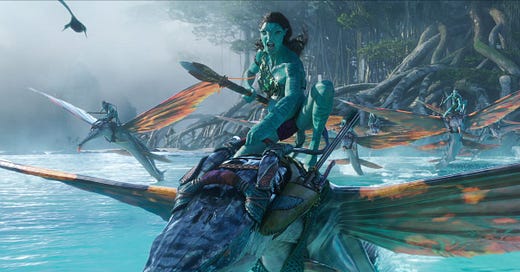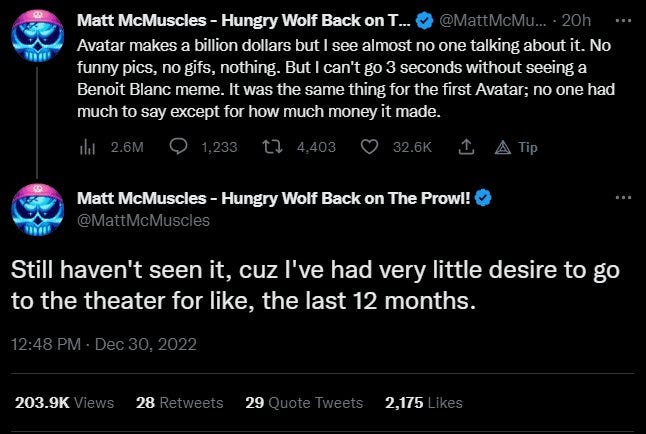The Long Take: Can You Measure Cultural Impact?
Another defense of Avatar and its place in the world. This time, its sequel.
Let me ask you a question. Name a character from Citizen Kane that isn’t Charles Foster Kane. If you have answered that one right, here's another one. Can you identify a line in a film that isn’t Rosebud? Finally, if you got everything correct, can you think of a reason why Orson Welles made Citizen Kane?
There are many stories told about Orson Welles making his feature debut, but the most heard about is how it became one of (if not) the greatest films within its medium. Citizen Kane did not cement itself with that title, upon its theatrical release in 1941. It did not find an audience, and the critical reception was tepid, particularly William Randolph Hearst, the media mogul that Charles Foster Kane, who went out of his way to block any sort of marketing. Jorge Luis Borges prescribed its legacy by denoting its high historical value but is not something that anyone would find a high on. But then, people started to notice when film theorist Andre Bazin, gave an impromptu speech following a French screening that year. He changed the crowd’s mind that this was a great film. He viewed Kane as an expression of unadulterated creative freedom and considering that Welles received this privilege from his contract with RKO Studios, it was a personal ideal that is met. And as Kane’s status as the GOAT steadily rose, Bazin’s worldview was beginning to be shared not just by critics, but by audiences who bring an emotional connection to the cinema.
Avatar: The Way of Water seems to fall on the opposite side of the spectrum; that is, whatever its artistic value, it has been worthless, in comparison to its large box office returns. As of writing this, the sequel to Avatar has grossed $1 billion globally and is set to break even with $2 billion, which would be enough for James Cameron to earn trust in handling four more sequels of the film. This has baffled some, if not, most of its detractors that they went into The Way of Water and… did not change their minds.
Instead, those detractors double down.



I wrote about the first Avatar and the evidence that it had any cultural cache, even if it was short-lived. I haven’t pinpointed the moment when people decided that it was unmemorable , so James Cameron hasn’t earned his Andre-Bazin-making-the-case-for-Citizen-Kane moment, but in reverse, quite yet. However, there is a feedback loop on social media, in which a contrarian opinion would attract some level of agreement that inflates itself, even if it seems detached from reality. A reality where the majority of people are enthralled by whatever they enjoyed about The Way of Water. While I can’t find it, I remember listening to a podcast in 2016, when Dana Schwartz, who was then a journalist before branching out to screenwriting, appeared because she tweeted that sentiment about Avatar having no cultural impact, receiving thousands of retweets and likes. Subsequent tweets like this had similar metrics. While I have no proof, it’s a bad way to start a conversation where anyone who is unable to answer the question, without looking like a philistine. That no one is talking about a particular scene, or there weren’t any memes evoked by the movie is a flimsy criterion for its artistic value.
One genuinely great aspect of The Way of Water lies in its luscious world-building, which is enhanced by the 3D technology utilised. It is perhaps the one thing that the Avatar franchise will leave as a legacy: being immersed in a world through the best possible lens, as it builds upon the creator’s vision, in which the source is not derived from a comic book, a pre-existing franchise or a best-selling novel. Cameron understands the technology well enough, that the results could pay off. Regardless of the storytelling quality, at three and a half hours, you find yourself adopting the universe that Jake Sully (Sam Worthington) has brought himself into during the first instalment. Viewers appreciate the beauty of it more if it’s done well like it’s being crafted as a jewel.
The language of responding to film has changed. In the time when Avatar was initially the highest-grossing film of all time, several things happened. The Marvel Cinematic Universe has cemented itself as a predominant player in the movie landscape, creating many entries that are directed by well-respected filmmakers but abiding by Kevin Feige’s specific vision. While Cameron was laying out a blueprint of the Pandora Universe, which will include four more entries, a sequel hasn’t been released yet. Memes were then an emerging language on the Internet, sometimes communicated through certain visual languages like bottom text and rage comics, but their popularity still depended on being weird and accidental.
Avatar is an earnest piece of work, expressing itself with awestruck, whenever something new is discovered. This also means that it's old-fashioned messaging - that the human race has some destructive impulses on new environments, particularly a test planet - is also delivered in earnestness, which means that whatever culture war The Way of Water will be relegated to (whether it’s through Cameron’s own remarks about testosterone being a toxin) the damage to its reputation would be minimal since it doesn’t aim at a particular segment of an audience who could potentially be offended by its transgression.
But Cameron is notable for making some of the greatest science fiction films of all time, particularly when the sequel is better than the original. Aliens, The Terminator and Terminator 2: Judgement Day all have memorable aspects to them that many people presume Avatar doesn’t have and it adds to the universe it’s indebted to. Part of the baggage that The Way of Water carries is that it has to be better than Avatar, and in some ways, it is. The story remains thin, but there are some characters - in particular, Colonel Quartrich and Kiri, one of Jake Sully’s children - that you do care about and the performances from Stephen Lang and Sigourney Weaver respectively bring some much-needed depth.
When Orson Welles made Citizen Kane, there was no definitive answer to his motivations for directing it. At the time of its release, it didn’t make any sense to anyone who watched it, but it earned a critical champion and moviegoers finally understood what that film was going for. Avatar and The Way of Water will have their critical dues from a loud contingent of fans, and it’s a bit premature to prognosticate its significance when the latter has only been out for a couple of weeks. But maybe, James Cameron doesn’t know what it can be or what it will be. All he knows is that he made something that appeals to someone. And that’s what matters the most.





